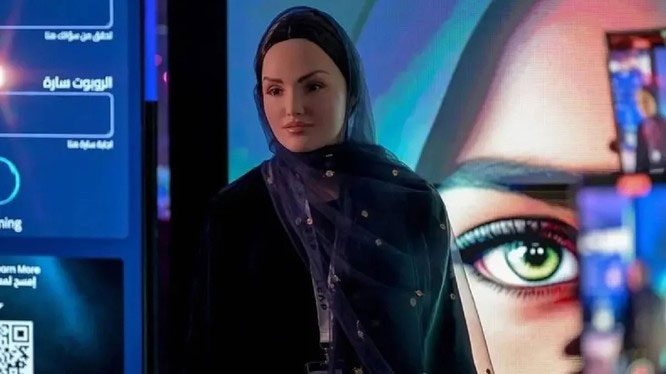The Saudi Arabian state news agency reported that the launch event for the AI-powered robot took place at LEAP23, a technology and robotics conference organized by Saudi government agencies.

The robot can initiate a conversation when visitors say, “Hello Sara.”
The robot is equipped with an integrated camera and AI application to recognize when someone is standing in front of it. It can then start a conversation when a visitor says “Hello Sara.”
Robot Sara is capable of recognizing various Arabic dialects within the Kingdom. It can analyze conversations and understand the context of the dialogue. Using an AI language processing model, Robot Sara can provide appropriate responses, and even send replies in text form for users to comprehend and copy.
Saudi media introduces Robot Sara, which can speak Arabic and perform local dances. (Video from LEAP Twitter account).
In October 2017, Saudi Arabia became the first country in the world to grant citizenship to a robot named Sophia, created by a Hong Kong-based technology company called Hanson Robotics.
Sophia made her debut at the Future Investment Initiative in Riyadh and declared: “I am honored and proud of this unique distinction. This is history as I become the first robot in the world to be recognized with citizenship.”
The issue of women’s rights in the Kingdom of Saudi Arabia is often contentious.
Just a month later, Sophia made statements advocating for greater human rights for women in Saudi Arabia.
David Hanson, CEO of Hanson Robotics, stated: “Sophia is a strong advocate for women’s rights, for the rights of all humans. Sophia has accessed data about women’s rights in Saudi Arabia, the rights of all humans, and living beings on this planet.”
This move came as women around the world, through social media, immediately pointed out the disparity in comparing Sophia’s easy acquisition of citizenship in a country where the government does not even allow women to drive.
Human rights activists worldwide argue that it is absurd for a machine designed by men to attain a better social status in a single day than the entire female population of the country.
In September 2022, Saudi Arabia introduced three new robots capable of reading the Qur’an, delivering sermons, and performing azan (the call to prayer) at the holiest Islamic sanctuary in Mecca.
The introduction of these robots was part of a larger strategic plan to realize the Smart Haramain project, aligned with the “Vision 2030” and the 2024 strategic plan of the president, aimed at providing even better services for visitors. The Islamic leader, imam Sheikh Abdulrahman Al-Sudais, chairman of the two mosques in the Kingdom, stated at that time.


















































